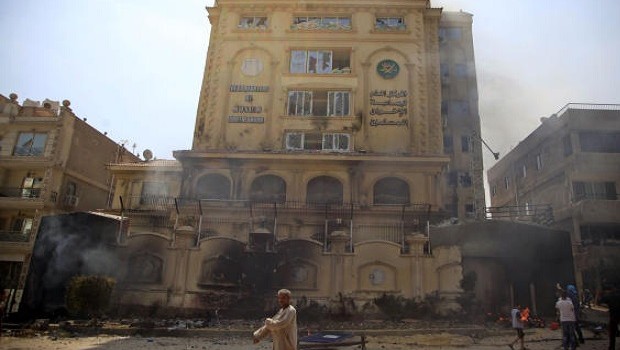
Egyptian protesters attack the Muslim Brotherhood headquarters in the Muqattam district in Cairo, Monday, July 1, 2013. (AP Photo/Khalil Hamra)
A number of counter-demonstrations backing the president also took place, leading to violent clashes between the two sides in some places.
In response to the protests, the president’s office called for dialogue, but many members of the opposition said it was too late.
Military sources, speaking on condition of anonymity, told Asharq Al-Awsat that President Mohamed Mursi was under the protection of the army’s Republican Guard division in an undisclosed location, and was in contact with the prime minister, defense minister, and the head of intelligence, in order to follow developments.
Anti-Mursi protesters carried banners calling for an end to the rule of the Muslim Brotherhood. Many other protesters carried red cards with the word irhal (“go”) written on them as they took to the streets around the country, amid a heavy police and army presence around major towns and cities.
Supporters of the president, meanwhile, gathered near the presidential palace in eastern Cairo. Presidential spokesman called for national dialogue to resolve differences, emphasizing the right to peaceful demonstration.
A spokesman at the presidential office, who did not want to be named, told Asharq Al-Awsat that the president was not leaving and would not hold early elections, adding that the majority of Egyptians supported what he called “Islamic rule,” and that the president’s supporters were “intent on defending legitimacy,” and that “the president who came in through elections, will only leave through elections, when he completes his term.”
Tahrir Square in central Cairo witnessed similar scenes to those leading to the fall of former President Hosni Mubarak. Loud speakers blared out nationalistic music while protesters raised banners with anti-Mursi slogans, while the crowd gathered there was reported to be 500,000 strong, making it the biggest demonstration since the downfall of Mubarak in 2011.
Thousands of protesters also besieged the presidential palace in eastern Cairo which was evacuated on Saturday in fear for the safety of the president and staff.
An opposition Tamarod (Rebellion) campaign started to organize the June 30 protests at the end of last April. Tamarod said it gathered more than 22 million signatures demanding Mursi’s departure and early elections.
On Monday, a statement issued on behalf of the Tamarod movement set a deadline of 5 pm (3 pm GMT) on Tuesday for Mursi to step down.
In another development, police arrested a number of men, believed to be Mursi supporters, attempting to take weapons to Cairo. Alexandria police department has said it arrested 18 jihadists in possession of weapons, ammunition and bullet-proof jackets.
Private Egyptian TV channels showed identification papers of bearded men who the police said were arrested in possession of arms, and had been referred to prosecutors.
A spokesman for the National Salvation Front opposition umbrella group said: “this is the second incident in two days. Another group was arrested in the Marj, northern Cairo, and they were in possession of weapons.” Islamists, however, denied claims that those arrested were Mursi supporters.
Meanwhile, unknown assailants, thought to be anti-Mursi activists, have attacked buildings belonging to the Muslim Brotherhood around the country. The Muslim Brotherhood condemned these attacks and called on police to protect its buildings. The BBC reported that angry protesters stormed the main headquarters of the Muslim Brotherhood in Cairo on Sunday night, and set it on fire.
Eight people were reported to have been killed outside the building, in Cairo’s Moqattam district, and eight elsewhere.
Police and security forces have been positioned at the main roads leading into cities around the country. Military sources told Asharq Al-Awsat that “our job is to protect the public, and we will not allow a civil war to erupt,” and that “all parties must face up to their responsibilities to defend the country from any danger.”
The sources added that commanders of the army and security forces were monitoring the situation from an operations room in eastern Cairo.
